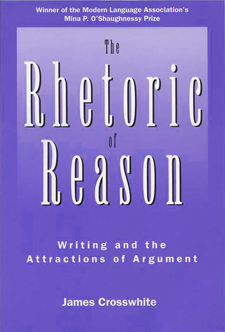The University of Wisconsin Press
Writing & Communication / Rhetoric / Philosophy / Education
The Rhetoric of Reason Rhetoric of the Human Sciences To those who have lost faith in the abilities of people to reach reasoned mutual agreements, and to others who have attacked the right-or-wrong model of formal logic, this book offers the reminder that the rhetorical tradition has always viewed argumentation as a dialogue, a response to changing situations, an exchange of persuading, listening, and understanding. Crosswhite's aim is to give new purpose to writing instruction and to students' writing, to reinvest both with the deep ethical interests of the rhetorical tradition. In laying out the elements of argumentation, for example, he shows that claiming, questioning, and giving reasons are not simple elements of formal logic, but communicative acts with complicated ethical features. Students must learn not only how to construct an argument, but the purposes, responsibilities, and consequences of engaging in one. Crosswhite supports his aims through a rhetorical reconstruction of reason, offering new interpretations of Plato and Aristotle and of the concepts of reflection and dialogue from early modernity through Hegel to Gadamer. And, in his conclusion, he ties these theoretical and historical underpinnings to current problems of higher education, the definition of the liberal arts, and, especially, the teaching of written communication.
|
“The Rhetoric of Reason will be a delight to hand my graduate students, many of whom have learned sophisticated objections to argumentative models of discourse. The book meets these concerns in a creative way. The teaching of effective writing must be a critical part of what we in the liberal arts do, and, of course, we should all be teaching good reasoning." |
|||||||||
|
|
If you have trouble accessing
any page in this web site, contact our Web manager. Updated 10/13/2014 © 2013 The Board of Regents of the University of Wisconsin System |
 James Crosswhite was, at the time this book was published, associate professor of English at the University of Oregon. He holds a Ph.D. in philosophy and has directed writing programs at the University of California, San Diego, and the University of Oregon. He has published many articles on rhetoric and argumentation.
James Crosswhite was, at the time this book was published, associate professor of English at the University of Oregon. He holds a Ph.D. in philosophy and has directed writing programs at the University of California, San Diego, and the University of Oregon. He has published many articles on rhetoric and argumentation.